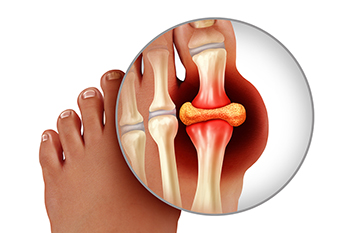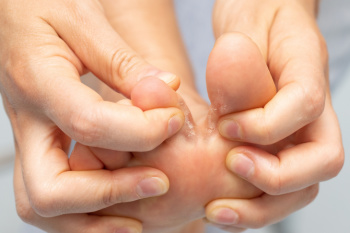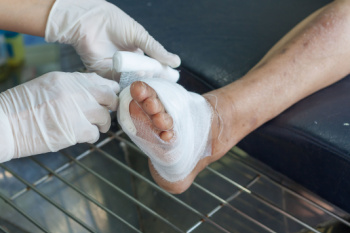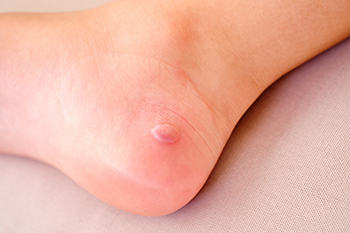
Blog (871)
An Overview of Clubfoot

Clubfoot is a congenital condition where a baby’s foot or feet are abnormally twisted. This deformity causes the foot to point downward and inward, resembling a club. It occurs due to an abnormal development of the tendons, muscles, and bones of the foot. The exact cause is often unclear but may involve genetic and environmental factors. Diagnosis typically occurs through physical examination shortly after birth, where the abnormal positioning is evident. In some cases, clubfoot affects both feet, known as bilateral clubfeet. Symptoms include an abnormal foot shape, limited movement, and difficulty placing the foot flat on the ground. If your child has clubfoot, it is strongly suggested that you contact a podiatrist who can properly diagnose the condition, and begin treatment which may include specific stretches, casting, or surgery to increase mobility.
Congenital foot problems require immediate attention to avoid future complications. If you have any concerns, contact one of our podiatrists of Westland Foot & Ankle Specialists, P.C.. Our doctors can provide the care you need to keep you pain-free and on your feet.
Congenital foot problems are deformities affecting the feet, toes, and/or ankles that children are born with. Some of these conditions have a genetic cause while others just happen. Some specific foot ailments that children may be born with include clubfeet, polydactyly/macrodactyly, and cleft foot. There are several other foot anomalies that can occur congenitally. What all of these conditions have in common is that a child may experience difficulty walking or performing everyday activities, as well as trouble finding footwear that fits their foot deformity. Some of these conditions are more serious than others. Consulting with a podiatrist as early as possible will help in properly diagnosing a child’s foot condition while getting the necessary treatment underway.
What are Causes of Congenital Foot Problem?
A congenital foot problem is one that happens to a child at birth. These conditions can be caused by a genetic predisposition, developmental or positional abnormalities during gestation, or with no known cause.
What are Symptoms of Congenital Foot Problems?
Symptoms vary by the congenital condition. Symptoms may consist of the following:
- Clubfoot, where tendons are shortened, bones are shaped differently, and the Achilles tendon is tight, causing the foot to point in and down. It is also possible for the soles of the feet to face each other.
- Polydactyly, which usually consists of a nubbin or small lump of tissue without a bone, a toe that is partially formed but has no joints, or an extra toe.
- Vertical talus, where the talus bone forms in the wrong position causing other bones in the foot to line up improperly, the front of the foot to point up, and the bottom of the foot to stiffen, with no arch, and to curve out.
- Tarsal coalition, when there is an abnormal connection of two or more bones in the foot leading to severe, rigid flatfoot.
- Cleft foot, where there are missing toes, a V-shaped cleft, and other anatomical differences.
- Macrodactyly, when the toes are abnormally large due to overgrowth of the underlying bone or soft tissue.
Treatment and Prevention
While there is nothing one can do to prevent congenital foot problems, raising awareness and receiving neonatal screenings are important. Early detection by taking your child to a podiatrist leads to the best outcome possible.
If you have any questions please feel free to contact our office located in Westland, MI. . We offer the newest diagnostic tools and technology to treat your foot and ankle needs.
What Is Gout?

Gout is a type of arthritis caused by the accumulation of uric acid crystals in the joints, leading to sudden, severe pain and inflammation. It commonly affects the big toe but can impact other joints as well. Early symptoms of gout include intense pain, swelling, redness, and warmth in the affected joint, often starting abruptly at night. If left untreated, gout can lead to chronic joint damage, kidney stones, and decreased mobility. Certain factors increase the risk of developing gout, such as a high-purine diet, obesity, and genetic predisposition. Diagnosis typically involves a combination of medical history, physical examination, and laboratory tests to measure uric acid levels and confirm crystal presence through joint fluid analysis or imaging. Managing gout effectively can require medication and lifestyle changes. If you experience persistent big toe pain from gout, it is suggested you schedule an appointment with a podiatrist for a thorough diagnosis and personalized treatment plan.
Gout is a painful condition that can be treated. If you are seeking treatment, contact one of our podiatrists from Westland Foot & Ankle Specialists, P.C.. Our doctors will treat your foot and ankle needs.
What Is Gout?
Gout is a form of arthritis that is characterized by sudden, severe attacks of pain, redness, and tenderness in the joints. The condition usually affects the joint at the base of the big toe. A gout attack can occur at any random time, such as the middle of the night while you are asleep.
Symptoms
- Intense Joint Pain - Usually around the large joint of your big toe, and it most severe within the first four to twelve hours
- Lingering Discomfort - Joint discomfort may last from a few days to a few weeks
- Inflammation and Redness -Affected joints may become swollen, tender, warm and red
- Limited Range of Motion - May experience a decrease in joint mobility
Risk Factors
- Genetics - If family members have gout, you’re more likely to have it
- Medications - Diuretic medications can raise uric acid levels
- Gender/Age - Gout is more common in men until the age of 60. It is believed that estrogen protects women until that point
- Diet - Eating red meat and shellfish increases your risk
- Alcohol - Having more than two alcoholic drinks per day increases your risk
- Obesity - Obese people are at a higher risk for gout
Prior to visiting your podiatrist to receive treatment for gout, there are a few things you should do beforehand. If you have gout you should write down your symptoms--including when they started and how often you experience them, important medical information you may have, and any questions you may have. Writing down these three things will help your podiatrist in assessing your specific situation so that he or she may provide the best route of treatment for you.
If you have any questions, please feel free to contact our office located in Westland, MI. . We offer the newest diagnostic and treatment technologies for all your foot care needs.
Relief Options for Athlete’s Foot

Topical treatments are the first line of defense against athlete's foot, a common fungal infection that affects the skin on the feet. These treatments are designed to target the fungus directly, helping to clear the infection and relieve symptoms such as itching, burning, and scaling. Mild antifungal creams, sprays, or powders containing active ingredients like clotrimazole, miconazole, or terbinafine are commonly used. These medications work by disrupting the fungal cell membranes, effectively eliminating the infection. It is important to apply these treatments consistently for the duration recommended, even if symptoms begin to improve, to ensure the infection is fully eradicated. In addition to medicated creams, keeping the feet clean and dry is critical. Using antifungal powders in shoes and socks can help prevent reinfection. For persistent or severe cases, it is suggested that you schedule an appointment with a podiatrist who may prescribe stronger topical or oral antifungal medications.
Athlete’s foot is an inconvenient condition that can be easily reduced with the proper treatment. If you have any concerns about your feet and ankles, contact one of our podiatrists from Westland Foot & Ankle Specialists, P.C.. Our doctors will treat your foot and ankle needs.
Athlete’s Foot: The Sole Story
Athlete's foot, also known as tinea pedis, can be an extremely contagious foot infection. It is commonly contracted in public changing areas and bathrooms, dormitory style living quarters, around locker rooms and public swimming pools, or anywhere your feet often come into contact with other people.
Solutions to Combat Athlete’s Foot
- Hydrate your feet by using lotion
- Exfoliate
- Buff off nails
- Use of anti-fungal products
- Examine your feet and visit your doctor if any suspicious blisters or cuts develop
Athlete’s foot can cause many irritating symptoms such as dry and flaking skin, itching, and redness. Some more severe symptoms can include bleeding and cracked skin, intense itching and burning, and even pain when walking. In the worst cases, Athlete’s foot can cause blistering as well. Speak to your podiatrist for a better understanding of the different causes of Athlete’s foot, as well as help in determining which treatment options are best for you.
If you have any questions please feel free to contact our office located in Westland, MI. . We offer the newest diagnostic and treatment technologies for all your foot and ankle needs.
Plantar Warts Can Be Treated!
Arthritis and the Feet

Arthritis is a condition characterized by inflammation of the joints, leading to pain, stiffness, and swelling. There are several types of arthritis, the most common being osteoarthritis, which results from wear and tear of the joints over time, and rheumatoid arthritis, an autoimmune disorder where the immune system attacks the joints. Other types include gout, which occurs due to uric acid buildup, and psoriatic arthritis, associated with the skin condition psoriasis. Arthritis can significantly affect the feet, causing pain and limiting mobility. Symptoms include joint pain, stiffness, swelling, and a reduced range of motion, often worsening with activity or after periods of inactivity. The feet can be particularly vulnerable, as they bear the body's weight, making walking and standing painful. If you have painful arthritis that is impacting your feet, it is suggested that you schedule an appointment with a podiatrist for advice on alleviating symptoms and managing the condition.
Arthritis can be a difficult condition to live with. If you are seeking treatment, contact one of our podiatrists from Westland Foot & Ankle Specialists, P.C.. Our doctors can provide the care you need to keep you pain-free and on your feet.
Arthritic Foot Care
Arthritis is a joint disorder that involves the inflammation of different joints in your body, such as those in your feet. Arthritis is often caused by a degenerative joint disease and causes mild to severe pain in all affected areas. In addition to this, swelling and stiffness in the affected joints can also be a common symptom of arthritis.
In many cases, wearing ill-fitting shoes can worsen the effects and pain of arthritis. Wearing shoes that have a lower heel and extra room can help your feet feel more comfortable. In cases of rheumatoid arthritis, the arch in your foot may become problematic. Buying shoes with proper arch support that contour to your feet can help immensely.
Alleviating Arthritic Pain
- Exercises that stretch the foot can prevent further pain and injury and increase mobility
- Most of the pain can be alleviated with anti-inflammatory drugs, heat, and topical medications
- Massages can help temporarily alleviate pain.
It is best to see your doctor for the treatment that is right for your needs and symptoms. Conditions vary, and a podiatrist can help you determine the right method of care for your feet.
If you have any questions, please feel free to contact our office located in Westland, MI. . We offer the newest diagnostic tools and technology to treat your foot and ankle needs.
Effective Stretches for Your Foot Arch

Stretching the arch of the foot can alleviate discomfort and improve flexibility. One simple method involves sitting in a chair and placing one foot over the opposite knee. Gently use your hand to pull your toes back toward your shin, feeling a stretch along the arch. Another effective stretch involves standing and placing one foot behind you on a low step, keeping the heel on the ground while leaning forward slightly. This helps to stretch the muscles and tendons along the bottom of the foot. Additionally, rolling a tennis ball under your foot while seated can help release tension in the arch. If you have pain in the arch of your foot, it is suggested that you consult a podiatrist who for a diagnosis and treatment options.
Stretching the feet is a great way to prevent injuries. If you have any concerns with your feet consult with one of our podiatrists from Westland Foot & Ankle Specialists, P.C.. Our doctors will assess your condition and provide you with quality foot and ankle treatment.
Stretching the Feet
Stretching the muscles in the foot is an important part in any physical activity. Feet that are tight can lead to less flexibility and make you more prone to injury. One of the most common forms of foot pain, plantar fasciitis, can be stretched out to help ease the pain. Stretching can not only ease pain from plantar fasciitis but also prevent it as well. However, it is important to see a podiatrist first if stretching is right for you. Podiatrists can also recommend other ways to stretch your feet. Once you know whether stretching is right for you, here are some excellent stretches you can do.
- Using a foam roller or any cylindrical object (a water bottle or soda can will do), roll the object under your foot back and forth. You should also exert pressure on the object. Be sure to do this to both feet for a minute. Do this exercise three times each.
- Similar to the previous one, take a ball, such as a tennis ball, and roll it under your foot while seated and exert pressure on it.
- Grab a resistance band or towel and take a seat. If you are using a towel, fold it length wise. Next put either one between the ball of your foot and heel and pull with both hands on each side towards you. Hold this for 15 seconds and then switch feet. Do this three times for each foot.
- Finally hold your big toe while crossing one leg over the other. Pull the toe towards you and hold for 15 seconds. Once again do this three times per foot.
It is best to go easy when first stretching your foot and work your way up. If your foot starts hurting, stop exercising and ice and rest the foot. It is advised to then see a podiatrist for help.
If you have any questions, please feel free to contact our office located in Westland, MI. . We offer the newest diagnostic and treatment technologies for all your foot care needs.
Differences Between Sprains and Strains

Sprains and strains in the foot and ankle are common injuries that can significantly impact mobility. Ankle sprains, particularly lateral sprains, occur when the ligaments are overstretched or torn, often due to twisting the foot. Recovery typically takes several weeks, although severe cases can take much longer. Strains affect the muscles or tendons and can also occur in the foot and ankle, causing pain, swelling, and reduced function. Prompt treatment is vital for quick recovery and may include bracing for support, guided exercises to restore strength and flexibility, and manual techniques such as massage. Severe injuries may require surgery, but with proper management, most people can achieve full recovery. A podiatrist can accurately diagnose these foot or ankle injuries and develop an individualized treatment plan that ensures efficient healing and prevents recurrence. If you suspect you have incurred a sprain or strain, it is suggested that you schedule an appointment with a podiatrist.
Foot Pain
Foot pain can be extremely painful and debilitating. If you have a foot pain, consult with one of our podiatrists from Westland Foot & Ankle Specialists, P.C.. Our doctors will assess your condition and provide you with quality foot and ankle treatment.
Causes
Foot pain is a very broad condition that could be caused by one or more ailments. The most common include:
- Bunions
- Hammertoes
- Plantar Fasciitis
- Bone Spurs
- Corns
- Tarsal Tunnel Syndrome
- Ingrown Toenails
- Arthritis (such as Gout, Rheumatoid, and Osteoarthritis)
- Flat Feet
- Injury (from stress fractures, broken toe, foot, ankle, Achilles tendon ruptures, and sprains)
- And more
Diagnosis
To figure out the cause of foot pain, podiatrists utilize several different methods. This can range from simple visual inspections and sensation tests to X-rays and MRI scans. Prior medical history, family medical history, and any recent physical traumatic events will all be taken into consideration for a proper diagnosis.
Treatment
Treatment depends upon the cause of the foot pain. Whether it is resting, staying off the foot, or having surgery; podiatrists have a number of treatment options available for foot pain.
If you have any questions, please feel free to contact our office located in Westland, MI. . We offer the newest diagnostic and treatment technologies for all your foot care needs.
Arthritis Can Cause Pain in the Feet and Ankles
Complications of Diabetes That Affect the Feet

Diabetes often leads to complications that affect the feet, including peripheral neuropathy. This condition damages peripheral nerves that are responsible for sending signals to the lower limbs and feet. Peripheral neuropathy causes symptoms like tingling, numbness, muscle cramps, and sharp or burning pain. Reduced sensation makes diabetic patients more susceptible to injuries from sharp objects or ill-fitting shoes, as they might not feel pain or pressure. Consequently, small wounds can go unnoticed, leading to infections and potentially severe complications like diabetic foot ulcers. These ulcers may worsen due to poor circulation, which hinders healing and can result in infections spreading to the bone, sometimes necessitating amputation. Managing these issues involves regular foot examinations, wearing proper footwear, and maintaining good blood sugar levels. A podiatrist can provide specialized care to manage symptoms, prevent further complications, and promote foot health. If you have complications of diabetes that are affecting your feet, it is suggested that you add a podiatrist to your medical team.
Diabetic foot care is important in preventing foot ailments such as ulcers. If you are suffering from diabetes or have any other concerns about your feet, contact one of our podiatrists from Westland Foot & Ankle Specialists, P.C.. Our doctors can provide the care you need to keep you pain-free and on your feet.
Diabetic Foot Care
Diabetes affects millions of people every year. The condition can damage blood vessels in many parts of the body, especially the feet. Because of this, taking care of your feet is essential if you have diabetes, and having a podiatrist help monitor your foot health is highly recommended.
The Importance of Caring for Your Feet
- Routinely inspect your feet for bruises or sores.
- Wear socks that fit your feet comfortably.
- Wear comfortable shoes that provide adequate support.
Patients with diabetes should have their doctor monitor their blood levels, as blood sugar levels play such a huge role in diabetic care. Monitoring these levels on a regular basis is highly advised.
It is always best to inform your healthcare professional of any concerns you may have regarding your feet, especially for diabetic patients. Early treatment and routine foot examinations are keys to maintaining proper health, especially because severe complications can arise if proper treatment is not applied.
If you have any questions please feel free to contact our office located in Westland, MI. . We offer the newest diagnostic and treatment technologies for all your foot and ankle needs.
Types of Corns and Relief Methods

Corns are thickened areas of skin that develop in response to pressure or friction, typically on toes or feet. They form as a protective response, often due to wearing ill-fitting shoes or repetitive rubbing. There are two main types of foot corns. Hard corns are small, concentrated areas of hardened skin on the tops or sides of toes. Soft corns are found between toes where moisture accumulates. Both types can cause discomfort or pain, especially while walking or wearing shoes. Relief can be found through gentle exfoliation, using a pumice stone or foot file to reduce thickness, followed by moisturizing with creams to soften the skin. Wearing properly fitting shoes with adequate toe room can help prevent recurrence. In severe cases, it is suggested you consult a podiatrist for professional treatment, such as trimming or padding, which may be necessary to alleviate discomfort and promote healthy skin.
If you have any concerns regarding your feet and ankles, contact one of our podiatrists of Westland Foot & Ankle Specialists, P.C.. Our doctors will treat your foot and ankle needs.
Corns: What Are They? and How Do You Get Rid of Them?
Corns can be described as areas of the skin that have thickened to the point of becoming painful or irritating. They are often layers and layers of the skin that have become dry and rough, and are normally smaller than calluses.
Ways to Prevent Corns
There are many ways to get rid of painful corns such as wearing:
- Well-fitting socks
- Comfortable shoes that are not tight around your foot
- Shoes that offer support
Treating Corns
Treatment of corns involves removing the dead skin that has built up in the specific area of the foot. Consult with Our doctors to determine the best treatment option for your case of corns.
If you have any questions please feel free to contact our office located in Westland, MI. . We offer the newest diagnostic and treatment technologies for all your foot and ankle needs.
More...
Risk Factors and Causes of Dance Injuries

Dance is an activity enjoyed by many for fun, recreation, and health benefits. It can be social, performed for an audience, ceremonial, or competitive. However, the diverse range of movements and techniques involved in different dance styles, ranging from ballroom to jazz, ballet to hip-hop and belly dancing, can lead to injuries if not approached with care. Beginners are particularly vulnerable due to inexperience and lack of technique. Additionally, poor fitness, improper posture, and fatigue contribute to the risk of sustaining a dance injury. Over-training and not allowing injuries to heal properly can also lead to chronic issues. To minimize these risks, dancers should warm up thoroughly, stay hydrated, wear appropriate footwear, and not push beyond their limits. Consulting a podiatrist can be beneficial for preventing and managing dance injuries, especially those involving the foot and ankle. If you have sustained a dance injury, it is suggested that you schedule an appointment with a podiatrist for an exam, diagnosis, and treatment options.
Sports related foot and ankle injuries require proper treatment before players can go back to their regular routines. For more information, contact one of our podiatrists of Westland Foot & Ankle Specialists, P.C.. Our doctors can provide the care you need to keep you pain-free and on your feet.
Sports Related Foot and Ankle Injuries
Foot and ankle injuries are a common occurrence when it comes to athletes of any sport. While many athletes dismiss the initial aches and pains, the truth is that ignoring potential foot and ankle injuries can lead to serious problems. As athletes continue to place pressure and strain the area further, a mild injury can turn into something as serious as a rupture and may lead to a permanent disability. There are many factors that contribute to sports related foot and ankle injuries, which include failure to warm up properly, not providing support or wearing bad footwear. Common injuries and conditions athletes face, including:
- Plantar Fasciitis
- Plantar Fasciosis
- Achilles Tendinitis
- Achilles Tendon Rupture
- Ankle Sprains
Sports related injuries are commonly treated using the RICE method. This includes rest, applying ice to the injured area, compression and elevating the ankle. More serious sprains and injuries may require surgery, which could include arthroscopic and reconstructive surgery. Rehabilitation and therapy may also be required in order to get any recovering athlete to become fully functional again. Any unusual aches and pains an athlete sustains must be evaluated by a licensed, reputable medical professional.
If you have any questions please feel free to contact our office located in Westland, MI. . We offer the newest diagnostic and treatment technologies for all your foot and ankle needs.
Gout Pain Can Be Managed
Causes and Management of Foot Wounds

Foot wounds can arise from various causes, with diabetic foot ulcers being a significant concern. Diabetes can lead to poor circulation and nerve damage, reducing the ability to feel injuries and heal properly. Other causes include trauma, such as cuts, burns, or punctures, and pressure sores from prolonged immobility. Proper management of foot wounds involves regular inspection, cleaning, and dressing changes to prevent infection. For diabetic foot ulcers, maintaining blood sugar levels and wearing appropriate footwear is essential. Applying antibiotic ointments and using offloading devices, such as special shoes or braces, can reduce pressure on the wound. Seeking medical attention from a podiatrist for persistent or severe wounds ensures appropriate treatment, which may include debridement or advanced therapies. If you have developed a foot wound, it is strongly suggested that you are under the care of a podiatrist who can effectively treat any foot condition, which include foot wounds.
Wound care is an important part in dealing with diabetes. If you have diabetes and a foot wound or would like more information about wound care for diabetics, consult with one of our podiatrists from Westland Foot & Ankle Specialists, P.C.. Our doctors will assess your condition and provide you with quality foot and ankle treatment.
What Is Wound Care?
Wound care is the practice of taking proper care of a wound. This can range from the smallest to the largest of wounds. While everyone can benefit from proper wound care, it is much more important for diabetics. Diabetics often suffer from poor blood circulation which causes wounds to heal much slower than they would in a non-diabetic.
What Is the Importance of Wound Care?
While it may not seem apparent with small ulcers on the foot, for diabetics, any size ulcer can become infected. Diabetics often also suffer from neuropathy, or nerve loss. This means they might not even feel when they have an ulcer on their foot. If the wound becomes severely infected, amputation may be necessary. Therefore, it is of the upmost importance to properly care for any and all foot wounds.
How to Care for Wounds
The best way to care for foot wounds is to prevent them. For diabetics, this means daily inspections of the feet for any signs of abnormalities or ulcers. It is also recommended to see a podiatrist several times a year for a foot inspection. If you do have an ulcer, run the wound under water to clear dirt from the wound; then apply antibiotic ointment to the wound and cover with a bandage. Bandages should be changed daily and keeping pressure off the wound is smart. It is advised to see a podiatrist, who can keep an eye on it.
If you have any questions, please feel free to contact our office located in Westland, MI. . We offer the newest diagnostic and treatment technologies for all your foot care needs.
Foot Blisters May Be Linked to Diabetes

Diabetic foot blisters are a concerning complication for people managing diabetes, primarily due to nerve damage and poor circulation. Friction blisters often occur in diabetics with neuropathy, where the lack of pain sensation leads to unnoticed skin rubbing and blister formation. One type of blister specific to diabetes can appear spontaneously and without inflammation, while posing a high risk for secondary infections. Certain fungal infections also contribute to blister formation, especially in warm, moist areas, such as between the toes. A podiatrist plays an essential role in managing these complications by providing regular foot exams and identifying early signs of blister formation. This foot doctor also can educate patients on proper foot care practices to prevent blisters, such as choosing suitable footwear and maintaining good hygiene. For fungal infections, a podiatrist can prescribe effective antifungal medications and monitor the healing process. If you are experiencing diabetic foot blisters, it is suggested that you make an appointment with a podiatrist for an exam and treatment.
Blisters are prone to making everyday activities extremely uncomfortable. If your feet are hurting, contact one of our podiatrists of Westland Foot & Ankle Specialists, P.C.. Our doctors can provide the care you need to keep you pain-free and on your feet.
Foot Blisters
Foot blisters develop as a result of constantly wearing tight or ill-fitting footwear. This happens due to the constant rubbing from the shoe, which can often lead to pain.
What Are Foot Blisters?
A foot blister is a small fluid-filled pocket that forms on the upper-most layer of the skin. Blisters are filled with clear fluid and can lead to blood drainage or pus if the area becomes infected.
How Do Blisters Form?
Blisters on the feet are often the result of constant friction of skin and material, usually by shoe rubbing. Walking in sandals, boots, or shoes that don’t fit properly for long periods of time can result in a blister. Having consistent foot moisture and humidity can easily lead to blister formation.
Prevention & Treatment
It is important to properly care for the affected area in order to prevent infection and ease the pain. Do not lance the blister and use a Band-Aid to provide pain relief. Also, be sure to keep your feet dry and wear proper fitting shoes. If you see blood or pus in a blister, seek assistance from a podiatrist.
If you have any questions, please feel free to contact our office located in Westland, MI. . We offer the newest diagnostic and treatment technologies for all your foot care needs.



